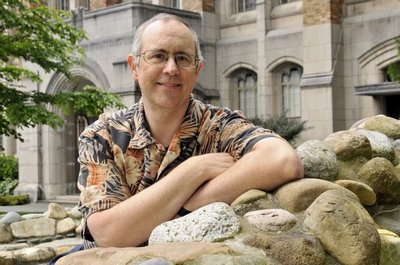May 6, 2010
A natural numbers man wins a contest for sacred poetry
Words and numbers are often seen as incompatible interests, but not in Stuart Anderson’s world.
Anderson, who is on staff at the Instructional Center, has been helping UW students understand physics and engineering since 1987, and he recently won the Merton Institute’s 2010 Poetry of the Sacred Contest.
“I was terribly interested in numbers and patterns when I was very little,” Anderson said. “When I was 3 or 4, I wanted to know how to write every number to a million. … No one was saying, ‘Hey kid, you should do math.’ I was just born with an instinct and interest in the subject.”
Poetry, on the other hand, is an interest that came courtesy of his father.
“My dad read poetry to my brothers and me every night. Samuel Taylor Coleridge’s poems were our bedtime stories,” Anderson said.
He started writing poetry when he was a 6-year-old and continued writing through high school and college. He was academically talented and earned many scholarships for college. One of the scholarships included a trip to Washington, D.C., to meet then-President Jimmy Carter.
“When I got to go to D.C. to meet the President, my hometown newspaper put it on the front page with the headline ‘Mathematician, poet to visit White House.'”
That’s not the only time that Anderson’s combination of mathematics and poetry has been pointed out as unusual or noteworthy.
“When I began college, I was at Seattle University because I had a lot of scholarship money and my mom wanted me to go to a Catholic school,” he said. “While there, I studied in the humanities honors program. After two years, my scholarship money ran out, so I transferred to UW to save money. I also changed my focus to math and physics.
“All of my Seattle U friends joked that I had betrayed them by switching to science, and all of my UW friends said that I was now studying something ‘real.'”
He believes that poetry, math and science absolutely play off of each other, though.
“The content of my poetry is usually based in science,” he explained. “I often write about the emotional experience of science … that moment of discovery, a sudden shift of perception, and awe.
“The process [in the two fields] is also very related. You’re reaching for that insight, trying to capture it. So, poetry and math seem similar to me because you have this idea that is initially hard to express. You need to work out the details. There is a sense of precision with both. I’m always looking for the most precise way of expressing something that I’ve never been able to express before. The idea is there first, you just have to find the right language… pin it down.”
He said that with his poetry, he always has to find exactly the right way to express his idea.
“That’s probably why it takes me 15 years to complete a poem. I’ll start one from time to time, and then put it uncompleted on a shelf for years.”
Anderson said his career keeps him busy, so he hasn’t written much poetry lately. He usually has physics and engineering on the brain.
“I had never entered a poetry contest,” he said. “But I saw an advertisement for the Poetry of the Sacred Contest in my wife’s Poets & Writers Magazine.”
According to the Merton Institute website, poetry of the sacred “expresses, directly or indirectly, a sense of the holy or, by its mode of expression, evokes the sacred. The tone may be religious, prophetic, or contemplative.”
Anderson said, “When I was younger, I kept getting my Rousseaus mixed up. There was the philosopher Jean-Jacques Rousseau and the painter Henri Rousseau.” From the philosopher, he took the idea of “natural religion,” and from the painter he took the painting The Repast of the Lion. “With both the painter and the philosopher in mind, I began to think of what the natural religion of a lion would be. So, I wrote a poem.”
That poem is the one that Anderson eventually entered in the Poetry of the Sacred Contest (Click here to read it). It will be published in The Merton Seasonal this summer.
“I thought it was a good poem, or I wouldn’t have submitted it. But I didn’t necessarily expect to win. I’ve only been published one other time and that was in college. It wasn’t even for a literary magazine,” he laughed. “It was a science fiction magazine that one of my friends worked on. They just needed to fill a page, so they used one of my poems.”
When asked about winning, he said, “It’s very exciting that someone actually liked what I did. It’s a good feeling to win because as a poet I’m still looking for my audience.”
He cited an example from a few years ago. “One of my friends is a librarian in Fremont and she asked me to come and read some of my poetry. After I read, a woman came up to me and told me that it’s so refreshing to hear poetry that isn’t about somebody’s inner life. My poetry is generally from a more scientific angle — I have a slightly different point of view, and it’s nice to know there’s an audience.”
Winning has also made Anderson more confident in his poetic abilities.
“I feel much more like I have a right to say I’m a poet,” he said. “There’s a sense of legitimacy.”
He also said that he will likely enter more contests in the future.
“I’ll go and dust off half-finished poems and finally finish them.”



